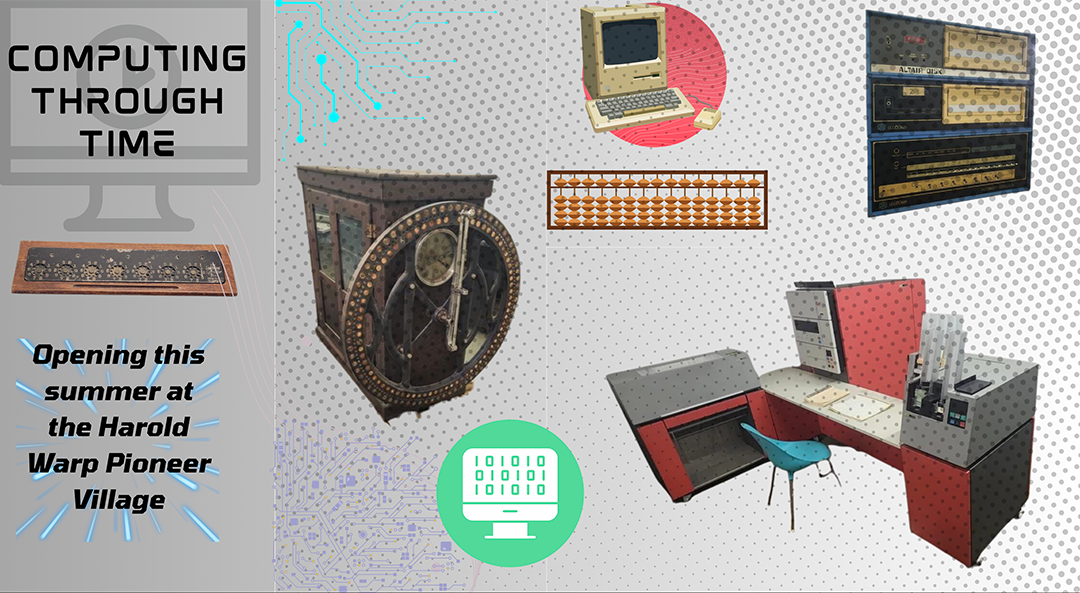A New Exhibit at Harold Warp Pioneer Village
Step right up, tech time travelers! Get ready to journey through the riveting saga of computing at the brand-new exhibit in Harold Warp Pioneer Village! From ancient abacuses to mind-boggling virtual reality headsets, this exhibit is a rollercoaster ride through the evolution of tech wizardry.
The ubiquitous presence of computers in contemporary society underscores their pivotal role in numerous professional and personal tasks. Remarkably, the origins of computing can be traced back several millennia. The inception of early computing devices can be found in the Far East with the advent of the abacus, an ancient calculating tool. Utilizing beads or stones on metal rods to represent numerical values, the abacus facilitated arithmetic operations and was a favored tool among merchants for tracking financial transactions. Subsequent advancements in computing included the Antikythera Mechanism, an ancient Greek analog computer dating back to 150 BC. Recovered from a shipwreck in 1901, this intricate device comprised over 30 bronze gears operated by a hand-crank, enabling the calculation of astronomical positions and eclipse timings.
In 1642, Blaise Pascal introduced the Pascaline, recognized as the first mechanical calculator. Operating on a decimal system, this hand-cranked machine featured wheels representing digits from 0 to 9 and had the capability to perform basic arithmetic functions like addition and subtraction.
The collaborative efforts of innovators in the 19th and 20th centuries significantly propelled the evolution of computers, revolutionizing fields such as business, communication, defense, and education. Charles Babbage, an esteemed English mathematician, earned the title “father of the computer” for his groundbreaking designs of the Analytical Engine and the Difference Engine, which automated complex mathematical computations including logarithm tables crucial for navigation.
Subsequent inventors contributed to the development of computing technology, such as Herman Hollerith, who devised a punch-card system for the 1890 census, and Vannevar Bush, creator of the Differential Analyzer at MIT, the first large-scale automatic general-purpose mechanical analog computer. Noteworthy is the creation of ENIAC (Electronic Numerical Integrator and Computer) by physicist John Mauchly, J. Presper Eckert, and their team at the University of Pennsylvania during World War II. ENIAC, the first programmable general-purpose electronic digital computer, occupied multiple rooms and was pivotal in defense and scientific endeavors.
The continuous innovation in computing technology led to the refinement and miniaturization of computers. To explore this fascinating history further, the Harold Warp Pioneer Museum will unveil a new exhibit in May, showcasing the evolution of computing. Housed on the second floor of the Shops &
Homes #13 building, the exhibit commences with the abacus and progresses through various milestones, culminating in contemporary technologies like virtual reality headsets. Emphasizing innovation as a central theme, the exhibit features an International Dial Time Recorder Clock at the entrance, manufactured by the International Time Recording Co., a precursor to IBM, and utilized in industrial workplaces circa 1910.
Among the exhibited items is the IBM System 3, introduced in the late 1960s to support small businesses with card-based batch-oriented applications like billing, payroll, and inventory control. Additionally, the exhibit showcases the Altair 8800, hailed as the world’s first minicomputer kit, introduced in the mid-1970s. This revolutionary kit, which users assembled from scratch by soldering connections, marked the advent of commercially successful home computers, devoid of a keyboard or monitor compatibility. Instead, users inputted information using toggle switches and received it using LEDs. The exhibit also pays homage to subsequent innovations in personal computing by renowned manufacturers like Commodore, Apple, and Texas Instruments.
So, grab your QR code scanners and get ready to geek out at this tech-tastic time warp. Psst! If you have any vintage video gaming treasures to spare, the museum is all ears – think Atari, Sega, Nintendo, and more! Time to dust off those relics and make a tech donation that’ll go down in history. Contact Pioneer Village at (308) 832-1181 or manager@pioneervillage.com for more information!


Recent Comments